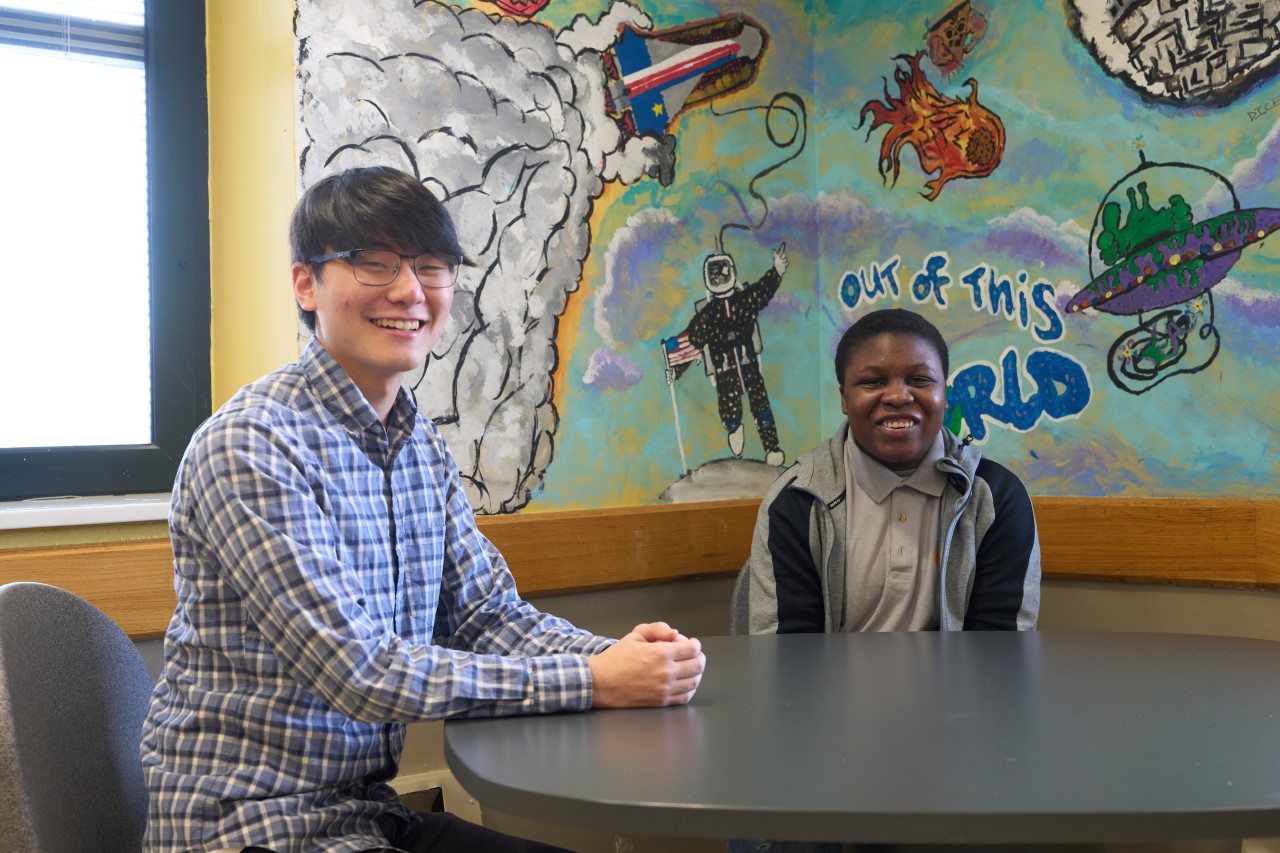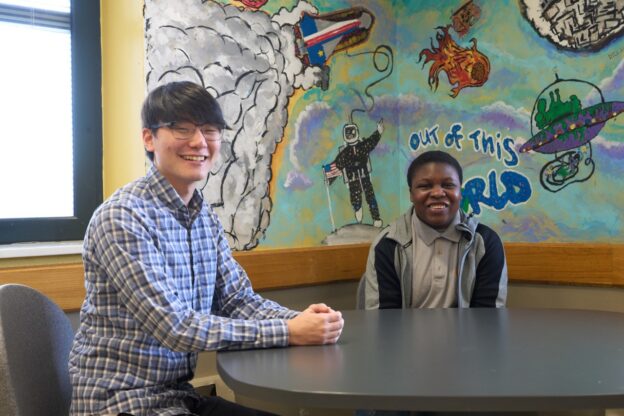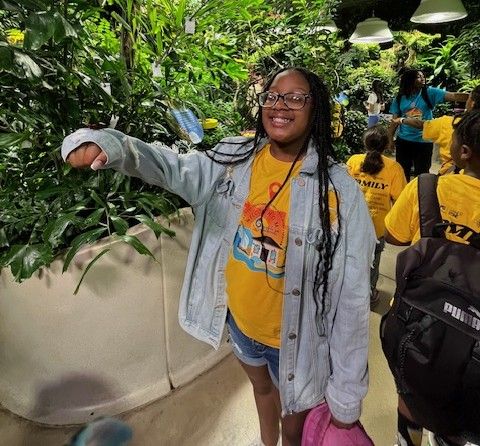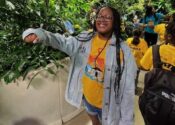
Clinical Coordinator Young Moon with a client of The Child Center Residential Treatment Facility
Earlier this summer, we shared with you sobering statistics regarding LGBTQ+ youth in America—and how critical it is that we support them, now more than ever. Clinical Coordinator Youngkwang (Young) Moon and the team at The Child Center Residential Treatment Facility (RTF) in Brooklyn are on the frontlines in this critical endeavor.
The RTF serves young people ages 12-18 who have had multiple psychiatric hospital placements or have been involved with the juvenile justice system. It is the only facility of its kind in the region. We care for youth people have given up on multiple times. They often struggle with significant mental health challenges, trauma, and social determinants of health. Yet they are as full of promise as any young person, as you can see by the personal stories of former residents like Danny and Nyomi.
They also are overwhelmingly LGBTQ+. According to Young, 75 percent of the youth at the RTF identify as LGBTQ+. Sadly, they often lack the support that most young people can take for granted.
But when they come here, they find a support system waiting for them. In the Q&A below, Young describes in eloquent and moving terms what that means for the youth here, and why he believes social workers play a pivotal role in moving society toward a truly inclusive and caring society. Young will be leaving The Child Center at the end of this month, and we are deeply grateful to him for strengthening the RTF in ways that will benefit our youth now and in the future.
The Child Center of NY: You are clearly very passionate about social work. What inspired you to become a social worker?
Young Moon, LMSW: Growing up, I loved the idea of helping people and providing a big impact for the community. People around me talked about joining the medical field as a way to do that. But I had an interest in the community as a whole, society as a whole. Going to school, learning more about social problems, I felt that social worker is a unique role, really addressing those issues and making an impact socially. Social workers support individuals and the community so that overall, as a society, we can improve. I really like that aspect. A lot of issues are not possible to address with medical care alone. We can medicate everyone only so much, but that’s not going to give youth the skills and tools they need to do well in the community. That’s what we need to do instead of always going to hospitals and having psychiatric stays.
As I worked in the field, I saw how important social work is for everyone. Social workers are in a unique position to have a big impact on our society as a whole. I identify with how social workers think, and I felt like I could do my part for the world as a social worker more than anything else.
Can you describe what it means to be clinical coordinator at the RTF?
The way I like to break it down is in three ways. First, the individual aspect; I work directly with clients and their families, providing therapy. The second portion is what we call mezza level: case management, connecting clients with government agencies and services in the community, and generally making sure everyone is working together to support the kids. The third level is using my social worker lens to ensure the facility is operating well therapeutically, and our team has the tools to really support our youth here.
Speaking of the team at the RTF, you speak very highly of the medical team. It seems like they have used every tool at their disposal, including their innovation and passion, to support LGBTQ+ youth in meaningful ways. Can you tell us more about that?
The medical team, led by Hannah Rush [Director of RTF Medical Services], really pushed for gender-affirming care. They saw the need for it and made it happen. One very significant thing they did was establish a partnership with Callen-Lorde, a medical provider that specializes in LGBTQ medical care and information. Callen-Lorde brings their medical van to the RTF monthly and answers our LGBTQ clients’ questions, including questions regarding hormonal therapy so they can get some education on it. I had one client who wanted to get hormonal therapy, and we didn’t have the structure for that at the time. But we are building the processes and structure so any youth in the future can get gender-affirming care, which includes affirming their gender identity, using their appropriate pronouns and preferred names, providing items that can be affirming such as chest binders, and referring clients to support systems and groups upon discharge. The medical team is doing a great job spearheading those processes for the kids. It is inspiring that they saw the need and really made a difference.
Why is it so important to offer LGBTQ+ youth this kind of care?
It can be very closely tied to their self-esteem. They experience parents, friends, other people who are supposed to be in their corner, denying who they feel they are. That really takes a toll on their mental health. They struggle with that. These kids deserve a safe space to feel like there are people who see who they are as a person. Even though we’re not their family, we care for them. It’s important they have that support, a place on their mental health journey where they can feel comfortable speaking about who they are as a person and where we provide as much support as we can so they can thrive and improve their mental health.
What has been the most rewarding part of your work at the RTF?
There is a lot that affected me. Seeing a kid who met their treatment goal and went into the community successfully. When I follow up, and they’re doing well, managed to go to school … hearing the struggles as well, but they’re really trying hard to make it work. I’ll hear from parents how their child has improved, that they’re excited to have them back home.
Even when I have cases where things don’t go the way we wanted them to—even in the hard moments—we know we did everything we can, and we hope eventually they will get there, and they know they can count on us for support. The way I see it, these kids don’t have a lot of people rooting for them. That they are able to form some connections here, and to know that people are rooting for them, even when they’re still figuring things out. … It’s one of those moments when you’re like, this is exactly why I entered the field. The youth here don’t have a lot. To be a part of giving second chances so they may be able to turn their lives around is really something. Society doesn’t give a lot of second chances. There aren’t a lot of opportunities for growth. We give them a place where they can really get that second chance in life and grow to be what they want to be–and know they can be.






